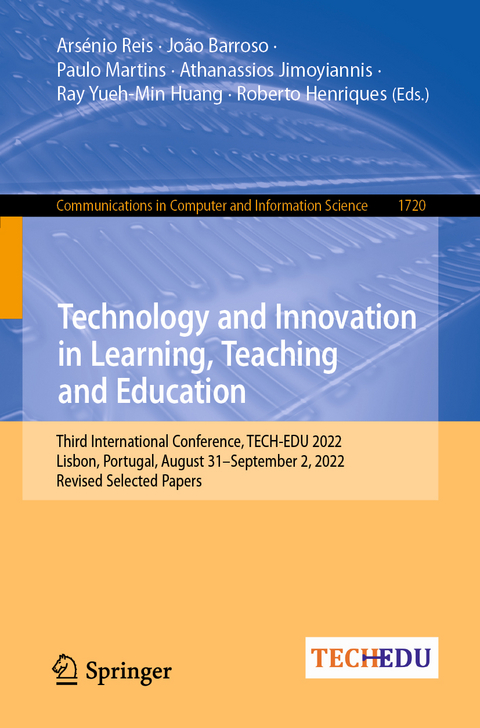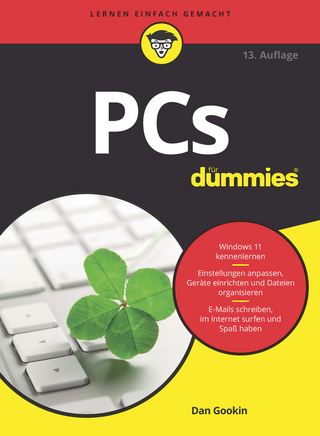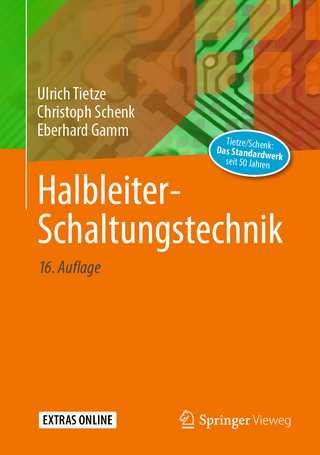
Technology and Innovation in Learning, Teaching and Education
Springer International Publishing (Verlag)
978-3-031-22917-6 (ISBN)
The 21 full papers and 18 short paper presented in this volume were carefully reviewed and selected from 80 submissions. The papers are organized in the following topical sections: Emergent technologies in education; Online learning and blended learning; Computer science education and STEM; Digital tools and STEM learning; ICT and critical thinking in higher education; Digital transformation in higher education; Artificial Intelligence in Education.
Emergent technologies in education.- Structuring collaborative setting in the Learner centered Learning environment.- Adaptation and personalization of learning management system, oriented to employees' role in enterprise context - literature review.- Augmented Reality in education: Exploring Greek teachers' views and perceptions.- An initial Framework for Adaptive Serious Games based on a systematic literature review.- Student Engagement Detection Using Emotion Analysis, Eye Tracking and Head Movement with Machine Learning.- Online learning and blended learning.- Teacher readiness to adopt the flipped learning model: Exploring Greek teachers' views and perceptions.- Designing, deploying and evaluating an undergraduate course on the "Didactics of Informatics".- On enhancing the conversation skills: The Dealogos prototype.- Learning Analytics Framework Applied to Training Context.- Towards an Accessibility Evaluationof eLearning Tools in Emerging 3D Virtual Environments like Metaverse: Taking Advantage of Acquired Knowledge in Moodle and Second Life.- On Modeling LMS Users' Quality of Interaction Using Temporal Convolutional Neural Networks.- Computer science education and STEM.- From stories to science: An exploration guide to promote epistemic practices in primary school.- Teacher Training in the Fields of STEAM: From Physical to Digital Tools.- Virtual Laboratory in Electromagnetism: A Study of Instrumental Orchestration.- Instrumental Orchestration in the Primary School and the use of digital resources to link STEM and Art: Systematic Literature Review.- Digital tools and STEM learning.- Know Me: promoting gender equality in education through an interactive digital narrative.- Enabling educators to self-assess their STEAM readiness.- A systematic literature review of strategies for implementing learning technologies in organizations.- Integrating video production in early ages to promote motivation for mathematics and transversal competences: examples from ViduKids project.- ICT and critical thinking in higher education.- Teaching Critical Thinking- A Task-Based Approach: Work in progress.- Developing critical thinking skills through work-based, blended apprenticeship curriculum for Business Communication.- Better teacher - better critical thinker. Good practices for pre-service teacher training students in Economics in synchronous online classes.- Using socially relevant projects to develop engineering students' project management, critical thinking, teamwork, and empathy skills: the UTAD-REFOOD experience.- Designing Critical Thinking Blended Apprenticeships Curricula to promote Reflective Thinking in Higher Education.- Developing critical thinking in higher education: is there a reason to change?.- Business-University collaboration in designing work-based activities fostering clinical reasoning.- Developing Computational Thinking Practices in Primary Education. Outcomes from a school-year instructional intervention.- Digital transformation in higher education.- The Challenges and Opportunities of Teaching Languages Online.- Facilitation within the scope of co-creative educational projects: case study.- TED Talks for Public Speaking Skills and Global Citizenship in ESP Classroom.- Facilitating online collaboration - a training proposal for teachers.- Drifts of Collaborative Online International learning (COIL) towards pedagogical innovation: a foretelling bibliometric analysis.- Strategic alignment of Knowledge Management Systems.- Artificial Intelligence in Education.- Practical ethical issues for artificial intelligence in education.- A toolkit for Re-Mar to enhance classroom ocean literacy.- The impact of artificial intelligence on a learning management system ina higher education context: a position paper.- A review of conversational agents in education.- Virtual assistants applications in education.- The impact of artificial intelligence on chatbot design.
| Erscheinungsdatum | 04.01.2023 |
|---|---|
| Reihe/Serie | Communications in Computer and Information Science |
| Zusatzinfo | XV, 488 p. 113 illus., 90 illus. in color. |
| Verlagsort | Cham |
| Sprache | englisch |
| Maße | 155 x 235 mm |
| Gewicht | 711 g |
| Themenwelt | Schulbuch / Wörterbuch ► Unterrichtsvorbereitung ► Unterrichts-Handreichungen |
| Informatik ► Weitere Themen ► Hardware | |
| Sozialwissenschaften ► Pädagogik | |
| Schlagworte | Applications • Artificial Intelligence • Computer aided instruction • Computer Networks • Computer Science • Computer systems • conference proceedings • Curricula • Education • Educational technology • Education Technology • E-Learning • Engineering • Human-Computer Interaction (HCI) • Informatics • information systems • learning • Learning Environments • Mathematics • Network Protocols • online systems • Research • Signal Processing • Software engineering • Teaching and learning |
| ISBN-10 | 3-031-22917-7 / 3031229177 |
| ISBN-13 | 978-3-031-22917-6 / 9783031229176 |
| Zustand | Neuware |
| Haben Sie eine Frage zum Produkt? |
aus dem Bereich


